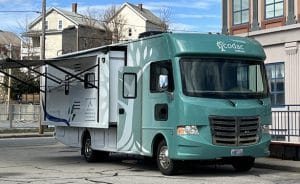By
Danielle Ray
October 5th, 2022

The mobile unit is the first in the nation to be approved under the new DEA regulations and features a dispensary, examination/treatment room, counseling room, waiting area, restroom, and fully equipped security system.
CODAC Behavioral Healthcare is revolutionizing patient care with its mobile medical unit, epitomizing the definition of meeting people where they are.
“We address all the issues, geographic and also demographic issues that have to do with mental health,” said CODAC President/CEO Linda Hurley, LCDCS. “Stigma, racist infrastructure, all those access issues that prevent good care for folks are also addressed by providing mobile treatment that goes to where people live.”
CODAC, the oldest and largest nonprofit outpatient provider for opioid treatment in Rhode Island, launched a mobile medical unit in a state-owned van just weeks before the pandemic hit in 2020.
“We were just getting moving and communities used to the idea of mobile care and the...
Posted in
Articles,
Subscribers |
Comments Off on Mobile medical unit used to address mental health issues in Rhode Island

